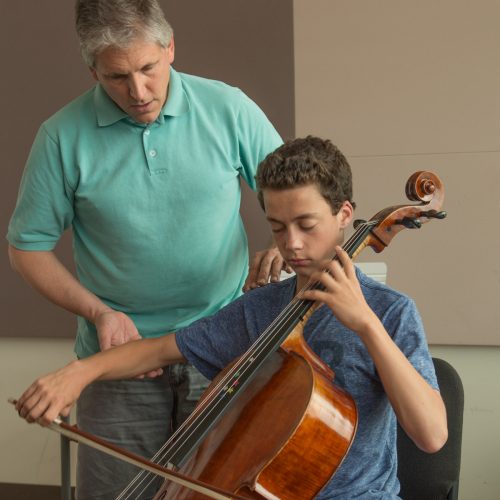Every Child Can Learn
Over the last half century the Suzuki Method has become the preeminent means for teaching children music in America and across much of the globe. Japanese violinist Dr. Shinichi Suzuki discovered that children could learn to play music to a high level of fluency via the same pathways they use to learn to speak their native tongue. He began to apply principles of language acquisition to the study of music, and called his method the mother-tongue approach.
The ideas of parental responsibility and involvement, loving and positive encouragement, repetition of desired execution, playfulness, and daily listening to excellent recordings of the child’s music are some of the unique features of this approach to Suzuki lessons. The KSA is devoted to embracing these tenents in our teaching.

Parent Involvement
Children learn to speak not only through listening and being surrounded by a language, but also by gentle, low-key coaching and encouragement from their parents. Similar to the language acquisition process, parents are centrally involved in the musical development of their child in the Suzuki approach. They themselves need to learn the fundamentals of the instrument so that they are able to effectively coach and teach the child at home, as well as showing their child the importance they place on the study of music.
Parents of KSA students must regularly attend lessons and take careful notes of each lesson so that they can practice effectively with their child each day at home between lessons. Parents work with their KSA teacher to create an enjoyable and powerful learning environment for the child. Thus, the parents, along with the child and the teacher, form a powerful and positive triangle in the Suzuki approach.
More About the Suzuki Method »
Encouragement
As with language, the child’s effort to learn an instrument should be met with sincere praise and encouragement. Each child learns at his/her own rate, building on small steps so that each one can be mastered. Not only will the teacher and parent gently encourage the child to achieve their best, children will also learn to support each other’s efforts, fostering an attitude of generosity and cooperation. A positive learning environment is of the utmost importance for the children’s long-term musical and emotional development. It is illuminating to remember that Dr. Suzuki’s ultimate goal was not the training of young virtuoso musicians through his instruction method, but the nourishing of moral people and fine citizens through the medium of studying musical instruments.
The fact that many students become outstanding musicians and instrumentalists is a lovely byproduct of Suzuki lessons, but learning how to solve complex challenges, learning the emotional and mental discipline that come with studying an instrument in this method, growing in the appreciation of and desire to create beauty, and feeling the support and richness of a musical community of peers are all routes towards educating and nourishing the whole individual. These aims are fostered from the positive encouragement of the child’s efforts by their parents, teacher, and peers in lessons at the KSA.
